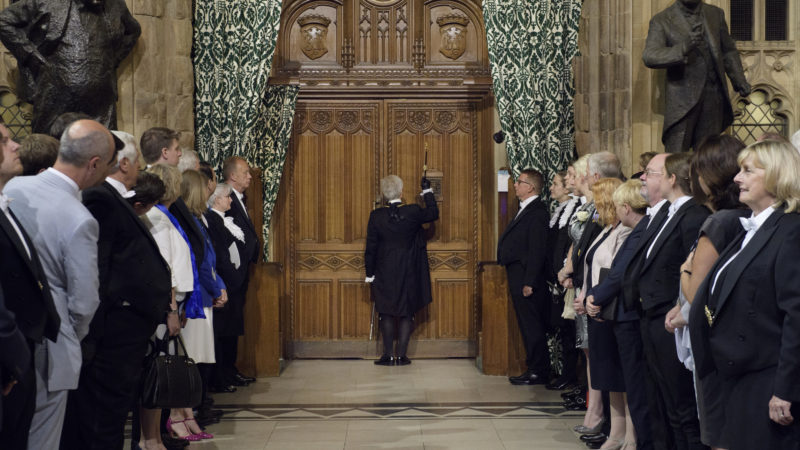The PM is on a losing spree in the Lords - and large majorities there will encourage some MPs to defy their own government, writes Lib Dem peer Lord Wallace.

Pic: The Lords’ Black Rod knocks on the door of the Commons…
The House of Lords is both indefensible and necessary. While it ought to be elected, this past few weeks the chamber has picked up the awkward details that the Commons all too often sweeps past.
The 2016 EU Referendum offered a simple answer to a very complicated question. Now that the EU (Withdrawal) Bill is moving through the Lords, this collection of former MPs, local councillors, professors, doctors, business people, bankers, trade union and charity executives are picking holes in in the government’s arguments.
There are some basic democratic and constitutional issues at stake: after a Leave campaign which promised to ‘restore’ parliamentary sovereignty, the government is now proposing that ministers should decide how to alter European regulations when returned to British control without having to get parliamentary approval. A majority of over 120 peers insisted on cutting back these proposed powers.
It’s difficult to examine such a major shift in Britain’s relationship with its neighbours, after 40 years of UK membership in the EU, when the Cabinet and the Conservative Party are so evidently divided.
Ministers are unable to tell Parliament what their plans are, in sector after sector, because they haven’t yet worked out what they want. So they tell MPs and peers that ‘these are matters for negotiation’, even though they are also saying that they plan to finish the main negotiations within the next few months.
In two recent speeches, the Prime Minister suggested that she now wants a much closer relationship with the EU than she suggested 18 months ago – but no-one in the government has yet spelled out the details of what this will mean.
One of the fuzziest areas of government thinking has been over its promise to maintain ‘frictionless trade’ across EU borders after we have left, while taking the UK out of both the Single Market (which provides a network of shared rules and regulations) and the Customs Union (which means no charges are imposed on goods at frontiers between member-states).
Vague promises have been made that new technology would solve the problems of queues at Dover and at the Irish border, and that we can negotiate ‘a new customs arrangement. UK border force staff have been cut since the referendum; recruitment is about to start again – too late to train new officers before ‘exit day’ in March 2019.
Another massive majority in the Lords has therefore rejected the government’s plan to leave the Customs Union, as impractical and potentially chaotic.
The Leave campaign depicted the EU as imposing a mass of unnecessary agencies and regulations, which we could sweep away as soon as we left, to return to the free trade arrangements we operated under in the 1970s. Now the government is struggling to stay associated with EU agencies that offer services that are vital to our safety and prosperity.
Medical members of the Lords have challenged the government over what happens to regulation of drugs when we leave the European Medicines Agency – while ministers have struggled to explain how they will continue to exchange intelligence on organised crime, or cooperate on foreign policy and defence after we have withdrawn from the meetings that coordinate national approaches.
And there’s an underlying scepticism that Conservatives will want to maintain high standards in many areas, so peers have forced the government to include in the Bill a commitment to European standards in environmental protection and food safety, and to continue to accept the European Charter of Fundamental Rights after Brexit.
There are three more days of the Report stage to go in the Lords, and more amendments likely to pass before the Bill returns to the Commons – where the government will try to overturn what the Lords have added.
Large majorities in the Lords will encourage some MPs to defy their own government – and the government will have to consider which changes to resist, and which it would be wiser to accept.
It’s quite likely that some issues will bounce back and forth between the two Houses (the process is called ‘Ping Pong’, for obvious reasons) before a compromise outcome is reached.
Right-wing newspapers are already ramping up attacks on the Lords – even calling for it to be abolished for daring to challenge ‘the will of the people’. What peers are really challenging is whether the government’s approach to Brexit makes sense in sector after sector.
That’s the job of a second chamber: not to challenge the overall principles of government policy, but to insist that ministers can explain in detail how they propose to put those principles into practice, and what is their rationale for the approach they have chosen.
There will be more battles to come…
Lord Wallace of Saltaire is a Liberal Democrat peer
Left Foot Forward doesn't have the backing of big business or billionaires. We rely on the kind and generous support of ordinary people like you.
You can support hard-hitting journalism that holds the right to account, provides a forum for debate among progressives, and covers the stories the rest of the media ignore. Donate today.



